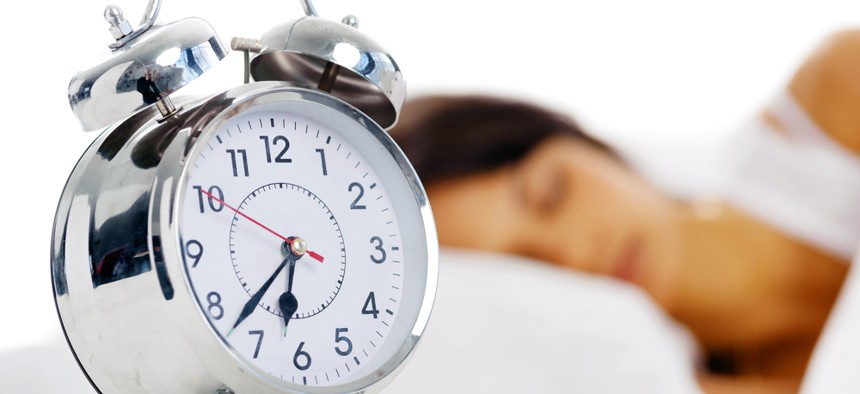
Warren Goldswain/Shutterstock.com
Let the Body Rest, for the Sake of the Brain
Sleep deprivation can take a heavy mental toll.
I’m sure a lot of subway riders are skilled nappers, but this car seemed to be particularly talented. Going over the Brooklyn Bridge on a recent morning, just as the sun was coming up, a row of men in nearly identical black suits held on to the straps with their eyes closed. Their necks were bent at the slightest of angles, like a row of daisies in a breeze, and as the car clanged over the tracks and the sun pierced through the grimy train windows, it finally dawned on me they were all sound asleep. Not even the bumps and the light could stop them from sneaking in 15 more minutes of shut-eye before work.
We take it for granted, but most people have to wake up for work (or school or other morning obligations) long before they want to. Sleeping in is treated as a cherished luxury—it’s somehow become normal that people wake up still exhausted, and anything but is a notable exception.
But rising before the body wants to affects not only morale and energy, but brain function as well.
“The practice of going to sleep and waking up at ‘unnatural’ times could be the most prevalent high-risk behavior in modern society,” writes Till Roenneberg, a professor of chronobiology at the Institute of Medical Psychology at Ludwig-Maximilians University in Munch.
In fact, according to Roenneberg's groundbreaking study in Current Biology, about one-third of people living in first-world countries are required to wake up two hours before their circadian clocks, or “natural waking times,” tell them to, and 69 percent of people have to wake up one hour before their bodies would like them to.
Of course, different people require different amounts of sleep and although there’s no universal rule for how long we should all be sleeping, it’s becoming increasingly clear that working late and waking early can cause serious problems. It’s not just repeated sleep deprivation that does people in, either. Just one restless night can seriously affect us in the morning.
Getting less than five hours of sleep a night makes people dumber and less able to concentrate, and it can make people more susceptible to false memories, according to a new study published in the September issue of Psychological Science. Led by Steven J. Frenda of the University of California, Irvine, the study found that of the 193 people tested, participants who slept for less than five hours a night were significantly more likely to say they had seen a news video when they in fact never had. The sleep-deprived group was also more suggestible. While recounting a personal story, 38 percent of them incorporated false information the researchers had given them, whereas only 28 percent of those who had more than five hours of sleep accepted the researchers’ false information in their story retelling. Frenda and his researchers postulate that not sleeping significantly disturbs our ability to encode information.
They also question the legitimacy of eyewitness testimonies in a court of law since, in this study, a good deal of people—especially those who didn’t get enough sleep—were susceptible to false memories. If someone goes on the stand after a sleepless night, it seems the chances are higher that he may misremember events.
The importance of sleep goes beyond courts and companies though. In the classroom, students who sleep more tend to be better at remembering what they’ve learned in the previous day than those who slept less, according to a 2001 study published in Science, and a 2014 study confirmed that more sleep leads to higher exam scores as well. Students who slept seven hours the night before an exam that tested them on economics, languages, and math, scored an average of 9 percent higher than students who only slept six hours the night before.
Getting less than five or six hours of sleep has also been connected to the inability to learn motor sequences. So before learning to play piano, first focus on getting proper sleep.
But there is the possibility of overriding the mind and body’s desire for sleep. By simply telling themselves they’ve slept well, studies show that people can temporarily trick their brains. Of course, continually getting too few hours of shut-eye will eventually cause problems, but telling yourself you got more sleep and that you feel refreshed (even if you don’t) leads to increased cognitive functioning in the morning, as evidenced by self-dupers who scored significantly higher on verbal fluency and neural processing tests.
The sleeping subway riders were also on to something. Even after a terrible night’s sleep, a 10-minute nap can significantly increase short-term alertness and improve problem-solving skills.
As we reached the Chambers Street subway station, the row of suited men and women seemed to instinctively know that they had arrived at their stop. In unison, they began to open their eyes and force themselves awake. Some gave themselves little slaps on their cheeks; others rubbed their eyes and temples. Then, like marionettes on a string, their spines straightened, their gazes turned straight ahead, and they clutched their briefcases and stepped out the door, onto the quay, up the stairs, and out onto the street, already noisy and awake.
(Image via Warren Goldswain/Shutterstock.com)






